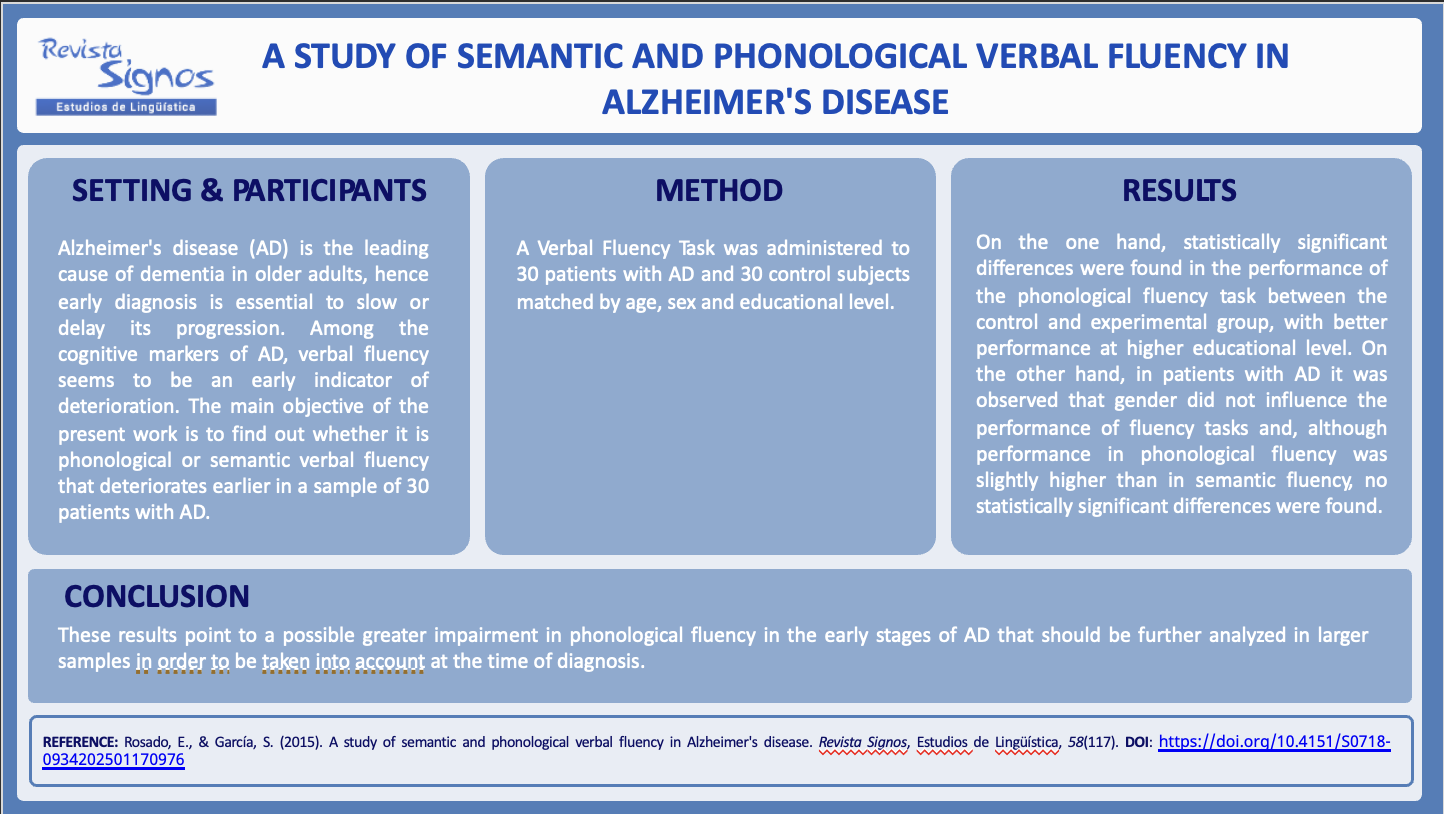Un estudio de la fluidez verbal semántica y fonológica en la enfermedad de Alzheimer
DOI:
https://doi.org/10.4151/S0718-0934202501170976Palabras clave:
Alzheimer's disease, Mild Cognitive Impairment, cognitive markers, language and verbal fluencyResumen
La enfermedad de Alzheimer (EA) es la principal causa de demencia en los adultos mayores, por lo que el diagnóstico precoz es fundamental para frenar o retrasar su progresión. Entre los marcadores cognitivos de la EA, la fluidez verbal parece ser un indicador temprano de deterioro. El objetivo principal del presente trabajo es averiguar si es la fluidez verbal fonológica o la semántica la que se deteriora antes en la EA. Se administró una tarea de fluidez verbal a 30 pacientes con EA y 30 sujetos control emparejados por edad, sexo y nivel educativo. Por un lado, se encontraron diferencias estadísticamente significativas en el desempeño de la tarea de fluidez fonológica entre el grupo control y experimental, con mejor desempeño en el nivel educativo superior. Por otro lado, en pacientes con EA se observó que el género no influía en el desempeño de las tareas de fluidez y, aunque el desempeño en fluidez fonológica fue ligeramente superior al de fluidez semántica, no se encontraron diferencias estadísticamente significativas. Estos resultados apuntan a un posible mayor deterioro de la fluidez fonológica en estadios tempranos de la EA que debería analizarse en muestras más amplias para tenerlo en cuenta en el momento del diagnóstico.
Citas
Alcantar, B. E., Reynoso, C., Ramos, M. L., Gómez, B. C., Miramontes, J. & Bernardette, A. (2011). La enfermedad del Alzheimer y su costo familiar y social. Revista de Divulgación Científica y Tecnológica de la Universidad Veracruzana, 24(2).
Baldo, J. V., Schwartz, S., Wilkins, D. P. & Dronkers, N. F., (2010). Double dissociation of letter and category fluency following left frontal and temporal lobe lesions. Aphasiology, 24(12), 1593-1604. https://doi.org/10.1080/02687038.2010.489260
Capitani, E., Laiacona, M., & Barbarotto, R. (1999). Gender affects word retrieval of certain categories in semantic fluency tasks. Cortex, 35(2), 273-278. https://doi.org/10.1016/s0010-9452(08)70800-1
Carballo, G., García-Retamero, R., Imedio, A., & García-Hernández, A. (2015). Diagnosis of cognitive impairment onset in older adults based on limitations in language skills/Diagnóstico del inicio del deterioro cognitivo en mayores a partir de limitaciones en las capacidades lingüísticas. Estudios de Psicología, 36(2), 316-342. https://doi.org/10.1080/02109395.2015.1026119
Clark, L. J., Gatz, M., Zheng, L., Chen, Y-L., McCleary, C., & Mack, W. J. (2009). Longitudinal verbal fluency in normal aging, preclinical and prevalent AD. American Journal of Alzheimer's Disease & Other Dementias, 24(6), 461-468. https://doi.org/10.1177/1533317509345154
Comesaña, A., & Coni, A. G. (2013). Análisis de tareas de fluidez verbal en enfermos de Alzheimer y adultos sanos. Temas em Psicologiia, 21(1), 269-281. http://dx.doi.org/10.9788/TP2013.1-19.
Faroqi-Shah Y., & Milman L. (2018). Comparison of animal, action and phonemic fluency in aphasia. International Journal of Language & Communication Disorders, 53, 370-384. 10.1111/1460-6984.12354
Folstein, M. F., Folstein, S. E., McHugh, P. R., & Fanjiang, G. (1975). MMSE Examen Cognoscitivo Mini-Mental. Publicaciones de Psicología Aplicada.
Galeote-Moreno, M. A., & Peraita-Adrados, H. (1999). Memoria semántica y fluidez verbal en demencias. Revista Española de Neuropsicología, 1(2-3), 3-18.
García, E., Rodríguez, C., Martín, R., Jiménez, J. E., Hernández, S., & Díaz, A. (2012). Test de Fluidez Verbal: datos normativos y desarrollo evolutivo en el alumnado de primaria. European Journal of Education and Psychology, 5(1), 53-64. https://doi.org/10.30552/ejep.v5i1.80
Gómez, G., & White, D.A. (2006). Using verbal fluency to detect very mild dementia of the Alzheimer type. Archives of Clinical Neuropsychology, 21(8), 771-775. https://doi.org/10.1016/j.acn.2006.06.012
Goñi-Sarriés, A., López-Goñi, J. J., Granados-Rodríguez, D., & González-Jiménez, A. (2015). Edad, escolarización y tareas de Fluencia Verbal para el screening de pacientes con Enfermedad de Alzheimer. Anales de Psicología/Annals of Psychology, 31(3), 773-781. https://doi.org/10.6018/analesps.31.3.168941
Henry, J. D., Crawford, J. R., & Phillips, L. H. (2004). Verbal fluency performance in dementia of the Alzheimer’s type: a meta-analysis. Neuropsychologia, 42(9), 1212-1222. https://doi.org/10.1016/j.neuropsychologia.2004.02.001
Horcajuelo, C., Criado-Álvarez, J. J., Correa, S., & Romo, C. (2014). Análisis de tareas de fluidez verbal semántica en personas diagnosticadas de la enfermedad de Alzheimer y adultos sanos. Revista De Investigación en Logopedia, 4(2), 112-131. https://doi.org/10.5209/rlog.58664
Hurks, P. P., Vles, J. S., Hendriksen, J. G., Kalff, A. C., Feron, F. J., Kroes, M., van Zeben, T. M., Steyaert, J., & Jolles, J. (2006). Semantic category fluency versus initial letter fluency over 60 seconds as a measure of automatic and controlled processing in healthy school-aged children. Journal of Clinical and Experimental Neuropsychology, 28(5), 684-695. https://doi.org/10.1080/13803390590954191
Hyde, J., & Linn, M. C. (1988). Gender differences in verbal ability: A meta-analysis. Psychological bulletin, 104(1), 53-69. https://doi.org/10.1037/0033-2909.104.1.53
Ivanova, O., García Meilán, J. J., Martínez-Nicolás, I., & Llorente, T. E. (2020). La habilidad léxico-semántica en la Enfermedad de Alzheimer: Un estudio de la fluidez verbal con categorías semánticas. Revista Signos. Estudios de Lingüística, 53(102), 319-342. http://dx.doi.org/10.4067/S0718-09342020000100319
Jiménez, M. A., Arrieta, E., Arriola-Manchola, E., Calle, B., Colmenarejo, J. C., Cuadrado, M., Fontecha, B., Fuentes, W., Gil-Gregorio, P., González-Glaria, B. & Kessel-Sardiñas, H. (2013). Cuidados Continuados en Atención Primaria a personas con Enfermedad de Alzheimer. Informe Alzheimer Atención Primaria.
Laws, K. R. (2004). Gender differences in lexical size across categories. Personality and Individual Differences, 36, 23-32.
Laws, K. R., Irvine, K., & Gale, T. M. (2016). Sex differences in cognitive impairment in Alzheimer’s disease. World journal of psychiatry, 6(1), 54. http://dx.doi.org/10.5498/wjp.v6.i1.54
Lozano-Gallego, M., Hernández-Ferrándiz, M., Turró-Garriga, O., Pericot-Nierga, I., López-Pousa, S., & Vilalta-Franch, J. (2009). Validación del Montreal Cognitive Assessment (MoCa): test de cribado para el deterioro cognitivo leve. Datos preliminares. Alzheimer. Realidades e Investigación en Demencia, 43, 4-11.
Marino, J., & Alderete, A. (2010). Valores normativos de pruebas de fluidez verbal categoriales, fonológicas, gramaticales y combinadas y análisis comparativo de la capacidad de iniciación. Revista Neuropsicología, Neuropsiquiatría y Neurociencias, 10(1), 79-93.
Marra, C., Ferraccioli, M., & Gainotti. G. (2007). Gender-related dissociations of categorical fluency in normal subjects and in subjects with Alzheimer’s disease. Neuropsychology, 21(2), 207-211. https://doi.org/10.1037/0894-4105.21.2.207
Martins, I. P., Vieira, R., Loureiro, C., & Santos, M. E. (2007). Speech rate and fluency in children and adolescents. Child Neuropsychology, 13(4), 319-332. https://doi.org/10.1080/09297040600837370
Meinzer, M., Wilser, L., Flaisch, T., Eulitz, C., Rockstroh, B., Conway, T., Rothi, L. J. G., & Crosson, B. (2009). Neural signatures of semantic and phonemic fluency in young and old adults. Journal of Cognitive Neuroscience, 21(10), 2007-2018. https://doi: 10.1162/jocn.2009.21219
McKhann, G. M., Knopman, D. S., Chertkow, H., Hyman B. T., Jack, C. R. Jr, Kawas, C. H., Klunk, W. E., Koroshetz, W. J., Manly, J. J., Mayeux, R., Mohs, R. C., Morris, J. C., Rossor, M. N., Scheltens, P., Carrillo, M. C., Thies, B., Weintraub, S., & Phelps, C.H. (2011). The diagnosis of dementia due to Alzheimer’s disease: Recommendations from the national institute on aging and the Alzheimer’s association work-group. Alzheimer’s Dementia, 7(3), 263-269. https://doi.org/10.1016/j.jalz.2011.03.005
Monsch, A. U., Bondi, M. W., Butters, N., Salmon, D. P., Katzman, R., & Thal, L. J. (1992). Comparisons of verbal fluency tasks in the detection of dementia of the Alzheimer. Type. Archives of Neurology. 49(12),1253-1258. https://doi.org/10.1001/archneur.1992.00530360051017.
Montañés, P., Pubiano, L., & Cano, C. (2005). Fluidez verbal en pacientes con enfermedad de Alzheimer: un análisis transversal y longitudinal. Revista Asociación Colombiana de Gerontología y Geriatría, 19, 816-827.
Moreno-Martínez, J., Laws, K. R., & Schulz, J. (2008). The impact of dementia, age and sex on category fluency: greater deficits in women with Alzheimer's disease. Cortex, 44(9), 1256-1264. https://doi.org/10.1016/j.cortex.2007.11.008
Navarro, E., López Pérez-Díaz, Á. G., Sanjuán, M., & Calero, M. D. (2018). La fluidez verbal en personas mayores y su relación con variables psicosociales y de funcionamiento cognitivo. Revista de Logopedia, Foniatría y Audiología, 38(4), 162-167. https://doi.org/10.1016/j.rlfa.2018.06.006
Paek, E. J., Murray, L. L., & Newman, S. D. (2020). Neural correlates of verb fluency performance in cognitively healthy older adults and individuals with dementia: A pilot fMRI study. Frontiers in Aging Neuroscience, 12, 73. https://doi.org/10.3389/fnagi.2020.00073
Proaño, N. J., & Aguilar, R. F. (2004). Enfermedad de Alzheimer. Clínica, diagnóstico y neuropatología. Plasticidad y Restauración Neurológica, 3(1-2), 95-105.
Rodriguez, F., Zheng, L., & Chui, H. (2019). Psychometric characteristics of cognitive reserve: how high education might improve certain cognitive abilities in aging. Dementia and Geriatric Cognitive Disorders, 47(4-6), 335-344. https://doi: 10.1159/000501150
Rosen, W.G. (1980). Verbal fluency in aging and dementia. Journal of Clinical Neuropsychology 2(2), 135-146. https://doi:10.1080/01688638008403788.
Rubinstein, W., Martínez, M., & Grasso, L. (2014). Demencia semántica y demencia tipo Alzheimer: ¿igual rendimiento en tareas semánticas? Revista CES Psicología, 7(1), 1- 15.
Tirapu-Ustárroz, J., Ríos-Lago, M., & Maestú, F. (2008). Manual de Neuropsicología. Viguera.

Descargas
Publicado
Cómo citar
Número
Sección
Licencia
Derechos de autor 2025 Revista Signos. Estudios de Lingüística

Esta obra está bajo una licencia internacional Creative Commons Atribución 4.0.
Aquellos autores que tengan publicaciones con esta revista, aceptan los términos siguientes:
- Los autores conservarán sus derechos de autor y garantizarán a la revista el derecho de primera publicación de su obra por medio de este documento de cesión de derechos de autoría, el cuál estará simultáneamente sujeto a la licencia de reconocimiento de Creative Commons que permite a terceros compartir la obra siempre que se indique su autor y su primera publicación esta revista.
- Los autores podrán adoptar otros acuerdos de licencia no exclusiva de distribución de la versión de la obra publicada (p. ej.: depositarla en un repositorio institucional o publicarla en un volumen monográfico) siempre que se indique la publicación inicial en esta revista.
- Se permite y recomienda a los autores difundir su obra a través de Internet (p. ej.: en publicaciones institucionales o en su página web) antes y durante el proceso de envío, lo cual puede producir intercambios interesantes y aumentar las citas de la obra publicada. (Véase el efecto del acceso abierto).










